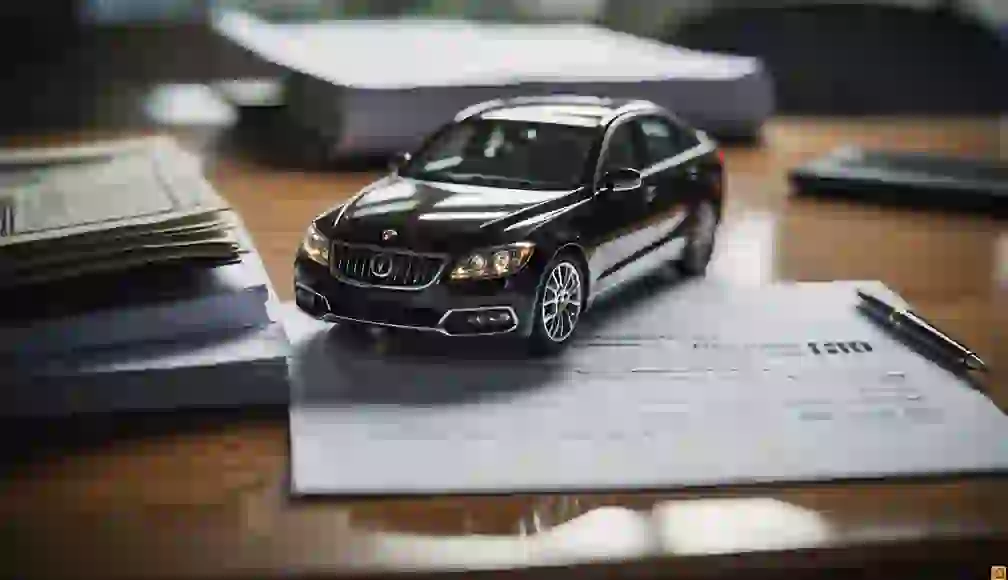Car Title Loans and Bankruptcy: Navigating Financial Challenges with Confidence
We are not layers, nor accountants. Below is not legal nor financial advice. This is for informational purposes ONLY!
Navigating the complex world of bankruptcy can be challenging, especially when you have outstanding car title loans. Car title loans are small secured loans that use your car as collateral, and their value is typically equal to 25% to 50% of the car’s value.
In this article, we will discuss how car title loans are treated in bankruptcy and what you can do to protect your vehicle during the process.
 |
Bankruptcy is a legal process that allows individuals or businesses struggling with debt to seek relief and potentially get a fresh start. There are two primary types of personal bankruptcy: Chapter 7, which involves liquidating assets to pay off debts, and Chapter 13, which involves setting up a repayment plan to pay down debts over time.
In either scenario, secured debts such as car title loans are included and may be treated differently depending on the specific chapter filed.
Many individuals dealing with bankruptcy worry about losing their mode of transportation, which is often essential for daily activities like going to work or taking care of family. It is crucial to understand the specific details of how car title loans are treated in bankruptcy and the steps you can take to protect your vehicle.
Key Takeaways
- Car title loans are treated as secured debts in bankruptcy and may be handled differently depending on the chapter filed.
- Both Chapter 7 and Chapter 13 bankruptcy offer options for potentially protecting your vehicle from repossession or liquidation.
- Understanding how car title loans are treated in bankruptcy is critical to managing financial difficulties and planning for life after bankruptcy.
Bankruptcy Fundamentals

What Is Bankruptcy?
Bankruptcy is a legal process that you can use when you’re unable to repay your debts. It allows you to either discharge, or eliminate, your debts or restructure them so that you can pay them off over time.
In the United States, bankruptcy is governed by federal law but is administered through bankruptcy courts in each state.
Bankruptcy proceedings involve a bankruptcy trustee, who is appointed by the court to oversee the process. The trustee will examine your financial situation, including your debts, assets, and exemptions, to determine the best course of action.
Types of Bankruptcy
There are two main types of bankruptcy that you might consider when facing financial troubles: Chapter 7 and Chapter 13.
Chapter 7 Bankruptcy
Chapter 7, also known as “liquidation bankruptcy”, involves selling your non-exempt assets to repay your debts. This could potentially include your car, depending on the circumstances. Not all debts are eligible for discharge—in some cases, you may be required to sell your car or return it to your lender. However, exemptions may apply, enabling you to keep certain assets.
| Pros of Chapter 7 | Cons of Chapter 7 |
|---|---|
| Discharge of most unsecured debts | Loss of non-exempt assets |
| Faster process (usually 3 to 6 months) | May harm your credit score |
| Possibility of keeping some assets through exemptions | Ineligible for discharge some debts, like student loans, alimony, and taxes |
Chapter 13 Bankruptcy
Chapter 13, also known as “reorganization bankruptcy”, involves setting up a repayment plan based on your income and living expenses. It allows you to catch up on missed payments and keep your property, including your car. This type of bankruptcy is ideal for debtors who have a regular income and can make monthly payments.
| Pros of Chapter 13 | Cons of Chapter 13 |
|---|---|
| Keep your property, like your car and house | Longer process (3 to 5 years) |
| Reduced amount owed on some debts | Requires regular income to make payments |
| Can catch up on missed payments | May not fully discharge all debts |
Before filing for bankruptcy, it’s essential to consult a lawyer who specializes in bankruptcy law. They can help determine which type of bankruptcy is right for your situation and guide you through the process at the bankruptcy court.
Car Title Loans in Bankruptcy

Impact on Car Title Loans
When you file for bankruptcy, it can have various effects on your car title loans. The outcome depends on the type of bankruptcy you file, as well as the status of your vehicle and the loan itself.
It’s important to understand the two types of bankruptcy and your rights as a borrower, so you can navigate the bankruptcy process and, hopefully, retain possession of your vehicle.
Chapter 7 Bankruptcy and Car Loans
In a Chapter 7 bankruptcy, your nonexempt property is liquidated to pay off your debts. If you have a car title loan, you might be worried about losing your vehicle. However, if your car is considered exempt property, you may be able to keep it. Exempt property varies by state, so check your state’s laws to determine whether your vehicle qualifies.
If your car is nonexempt, you have a few options to protect it:
- Reaffirmation agreement: You can sign a reaffirmation agreement with your lender, agreeing to continue making payments on your car title loan. This allows you to keep your vehicle, but you must be able to continue making timely payments.
- Redeeming: You can pay off the loan in a lump sum and avoid repossession. This might be difficult if you’re already in financial distress, but it’s a possibility if you have access to funds.
- Surrendering the vehicle: In some cases, it might be best for you to surrender your vehicle to your lender. If your car is worth less than the remaining loan balance or you can’t afford the payments, voluntary repossession might be a viable option.
Chapter 13 Bankruptcy Strategies
Chapter 13 bankruptcy involves restructuring your debts and creating a repayment plan. This can work to your advantage if you have a car title loan, as it might allow you to keep your vehicle while repaying your debts over a 3 to 5 year period.
Some possible strategies in a Chapter 13 bankruptcy include:
- Repayment plan: Your car title loan can be included in your repayment plan. This means that you will continue making payments under the new plan, potentially with a reduced interest rate or adjusted repayment terms.
- Cram down provision: If your car is worth less than the remaining loan balance and you’ve owned it for more than 910 days, you might qualify for a cram down provision. This allows you to reduce the loan amount to match the vehicle’s value, potentially lowering your monthly payments.
- Surrender: If you cannot afford your car title loan payments, you can surrender your vehicle as part of your Chapter 13 bankruptcy. This removes the debt from your repayment plan, but you will lose your car.
It’s important to consult with an attorney or financial advisor to determine which strategy is best for your situation.
Protecting Your Vehicle
When you file for bankruptcy, it’s natural to worry about the possibility of losing your car. Thankfully, there are options to help protect your vehicle during this process. In this section, we will explore exemptions, reaffirmation agreements, and redeeming your vehicle to better understand how you can protect your car during bankruptcy.
Exemptions and Your Car
The first step in protecting your car during bankruptcy is to understand the exemptions available to you. Exemptions are legal protections that allow you to shield certain assets, like your car, from being sold by the bankruptcy trustee.
Each state has its own set of exemptions, with some states allowing you to choose between federal and state exemptions.
To keep your car, it’s crucial to determine the available motor vehicle exemption and assess whether your car’s equity (the difference between your car’s current value and any loan balance) falls within that exemption limit. If the equity is covered by the exemption, the trustee cannot sell your car to pay off your debts.
The Reaffirmation Agreement
Another option to protect your car in bankruptcy is by entering into a reaffirmation agreement with your lender. In a reaffirmation agreement, you agree to continue making payments on your car loan after the bankruptcy, essentially excluding the debt from the bankruptcy process. This method is common in Chapter 7 bankruptcy cases.
It’s essential to understand the potential consequences of reaffirming a car loan before signing the agreement. For example, if you later default on the loan, the lender may repossess the car and hold you responsible for any remaining balance after the repossession sale.
Redeeming Your Vehicle
Redeeming your vehicle involves paying the lender a lump sum equal to the current market value of the car, effectively discharging the remaining loan balance in the bankruptcy.
This option may be suitable if your car is worth less than the outstanding loan balance since the lender must accept the market value as payment in full.
However, redeeming your vehicle can be challenging if you don’t have the funds readily available. In some cases, you may be able to secure a new loan from a different lender to finance the redemption, but this depends on your creditworthiness and available lenders.
Rebuilding Credit After Bankruptcy
After filing for bankruptcy and getting a discharge, it’s crucial to start rebuilding your credit. This impacts your ability to obtain loans and financing in the future. Here are a few steps to help you rebuild your credit score:
- Review your credit report: Check your credit report for any errors. Make sure that all discharged debts are correctly reported.
- Create a budget: Make a budget to track your expenses. This will help to prioritize paying off any outstanding bills and debts.
- Pay your bills on time: Timely payments contribute to a positive credit history. They also help improve your credit score.
- Use a secured credit card: Apply for a secured credit card from a credit union or local bank. This type of card requires a deposit, which becomes your credit limit. Use it responsibly and pay off the balance monthly.
- Be an authorized user: If a friend or family member is willing, you can become an authorized user on their credit card. This could help you to establish a good credit history.
- Consider a credit builder loan: Some credit unions and banks offer these loans designed to help rebuild credit. Timely loan payments will improve your credit score.
If you still feel the need for a car title loan submit your information today
Obtaining a Car Loan After Bankruptcy
It is possible to obtain a car loan after bankruptcy, but this may depend on factors such as how much time has passed since the bankruptcy and the current state of your credit. Here are some suggestions on obtaining a car loan after bankruptcy:
- Check your credit score: Knowing your credit score will help you understand what types of loan terms you might be eligible for.
- Start with a credit union or local bank: These institutions might be more open to working with you. They are typically more community oriented than larger banks.
- Consider subprime lenders: Subprime lenders specialize in offering loans to people with less than perfect credit. Just be cautious of the associated higher fees and interest rates.
- Get a pre approval: Having a pre approval letter can show dealers that you’re serious about purchasing a car. It can also potentially lead to better financing terms.
- Prepare for a down payment: A larger down payment can show lenders that you are taking financial responsibility. It can also reduce the risk associated with granting a loan.
- Find a co signer: Having a co signer with a good credit score can increase your chances of obtaining a car loan after bankruptcy.
Frequently Asked Questions
Is it possible to secure a title loan while undergoing Chapter 13 bankruptcy?
Yes, it is possible to secure a title loan while undergoing Chapter 13 bankruptcy. However, you must obtain permission from your bankruptcy trustee. They will evaluate your specific situation and assess whether the loan is necessary and beneficial. The trustee may request that you adjust your Chapter 13 repayment plan to accommodate the additional loan.
How can I obtain a title loan during Chapter 7 bankruptcy proceedings?
Obtaining a title loan during Chapter 7 bankruptcy proceedings can be challenging. This is because your non-exempt assets may be sold to repay your debt. It is important to discuss your intentions with your bankruptcy attorney and consider possible alternatives. Your attorney may guide you through any necessary exemptions, reaffirmation agreements, or other means to secure a title loan during this process.
What are the options for handling a title loan in a bankruptcy forgiveness program?
In a bankruptcy forgiveness program, you have two primary options for handling a title loan: redemption or reaffirmation. Redemption involves paying the market value of the vehicle in a lump sum to clear the title loan debt. Reaffirmation consists of negotiating with the lender and coming to an agreement to continue making loan payments after bankruptcy, allowing you to keep the vehicle.
How can I retrieve my vehicle title after completing Chapter 13 bankruptcy?
After completing your Chapter 13 bankruptcy repayment plan, you should receive a discharge order from the court. This document clears your remaining eligible debts, including your car title loan. You can then contact your lender, provide proof of the discharge, and request the return of your vehicle title. They will typically release the lien on your title, allowing you to regain full ownership of the vehicle.
Are there ways to legally navigate out of a title loan commitment?
Yes, there are legal ways to navigate out of a title loan commitment. One common option is refinancing the title loan with another, more manageable loan or renegotiating the terms of your current loan with the lender. Alternatively, you can sell your vehicle, pay off the outstanding loan balance, and then seek a new, more affordable vehicle. Another option may be to pursue bankruptcy if you’re experiencing significant financial hardship. It’s crucial to consult with a financial professional or an attorney to discuss your specific situation and options.
Does filing for bankruptcy affect my ability to get a car loan in the future?
Filing for bankruptcy does affect your ability to get a car loan in the future. It will negatively impact your credit score.
However, with time and responsible financial decisions, your credit can improve. This makes it possible to qualify for a car loan at more favorable interest rates.
Following your bankruptcy, consider focusing on rebuilding your credit. You can do this through responsible credit usage, timely payment of bills, and maintaining a stable income.
Frank is now in charge of content creation. He has read Jer's How to Start a Car Title Loan Business book and has been personally trained in the industry by Jer. All content will be reviewed and approved of by Jer. He did all of the web design for this site, SEO, and online promotion. He is a seasoned website designer and content creator with a career spanning over two decades. My journey in this field began in 1997, and I’ve been specializing in WordPress and content creation since 2007. With a deep understanding of Search Engine Optimization (SEO), I’ve been optimizing websites for search engines since 1998. My expertise lies in manipulating the back end code of WordPress sites and crafting high quality, SEO friendly content to maximize their potential. I believe that compelling content is at the heart of every successful website, and I strive to create unique, engaging content that drives traffic and conversions. I learn fast and become an expert as needed.
Frank.Masotti@Gmail.com
3432 Skips Lane
Phoenix AZ, 85012
(602) 888-3448
| Frank Masotti | Google fundamentals of digital marketing certified |
| Premium Content Creators | Internet Service Agency |
| Linked In | X/Twitter |
| Medium | |
| YouTube | TikToc |


